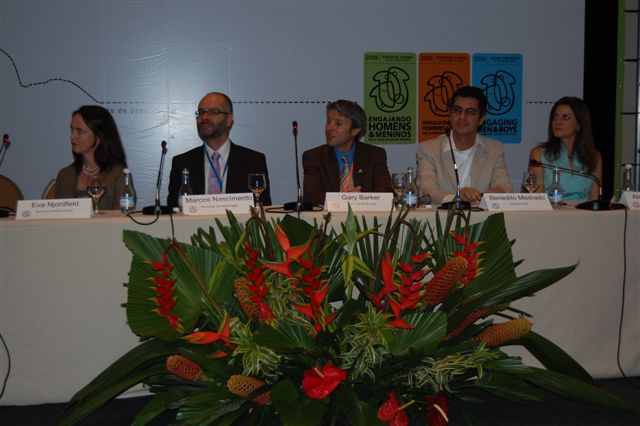"This is historic, for the first time men and women come together in this manner to work on women's issues" said Eva Njordfeld with Save the Children-Sweden in her opening remarks.
She was addressing just hours ago the opening session of the Global Symposium on Engaging Men and Boys in Achieving Gender Equality taking place this week in Rio de Janeiro, Brazil.
After 3 years in the making, with an investment of half a million dollars, and organized by Promundo, UNFPA, MenEngage, White Ribbon Campaign, Instituto Papai and other organizations this forum has attracted close to 450 participants from 80 countries around the world. Presenters include the heads of UNIFEM, UNAIDS, representatives from the World Health Organization, the Brazilian Minister for Women's Policies and a video address by Ban Ki-moon, Secretary General of the United Nations.
 Photo by Francisco Aguayo, Promundo
Photo by Francisco Aguayo, Promundo
What is striking about this meeting is the number of men involved, accounting for at least half the attendants. A far cry compared to other gatherings on women, such as the Beijing Conference on Women in 1995, where women far outnumbered men and 99% of the attendants at my NGO workshop were women. And even compared to a meeting on rural women I attended just weeks ago in New York at the United Nations Commission on the Status of Women, where out of 70 attendants, there was only one man, me.
Not only that men are here, but they are excited to be here, as active participants. Paul Hunt, the Canadian Ambassador to Brazil told me "we men are better men because of equality with women." A delegate from Bangladesh, Osman Goni Talukder, shared with me that he was proud to be the Deputy Chief at the Ministry of Women and Children Affairs in his country.
Fatherhood and Men's Participation in the Lives of Children is being explored, together with plenaries and workshops with titles such as Dialogue with Women's Rights Movements, Including Men and Masculinities in Gender Equality Policies, Engaging Men to Prevent Violence against Women and Girls, and Youth Activism for Achieving Gender Equality.
I asked Ms. Nilcea Freire, Minister for Women's Policies for Brazil how she thinks men can contribute to women's empowerment, and she simply told me "by sharing responsibilities at home so women can also have time to get involved in government and societal issues." It made sense to me.
Ben, with EngageHealth in Tanzania, asked me what I was doing at this symposium. When I told him that I work so fathers can connect with their daughters and bring them back to school in India and other countries (see the Father and Daughter Alliance - FADA at www.GlobalFADA.org), he opened his eyes wide and said: "Why didn't I think of it?"
Related to this, Ms. Purnima Mane, Deputy Executive Director of UNFPA pointed out "as a daughter of an incredibly supportive father, without whom I would not be here today, I am delighted to see this meeting bringing together men and women" to work on this crucial issue and added that "men have an indispensable part to play."
A Global Village has been set up, with a photo expo and tables where men and women share about organizations such as Voice Male (USA), a magazine exploring a new masculinity, Men's Resources International, Men for Gender Equality (Sweden), International Center for Research on Women, and the Center for Digital Storytelling. The effort has been financed by organizations as varied as CIDA, Ford Foundation, MacArthur Foundation, the Brazilian Health Ministry, Nike Foundation, Oxfam Novib, SIDA, and a host of UN agencies.
The gathering promises to be a lively one. There are some discordant notes and opinions, which are normal for a global gathering of this kind, but by and large the collective sense seems to be one geared toward finding commonalities between men and women sharing a common cause. Ines Alberdi, Executive Director of UNIFEM stated that "there is no turning point; we must work together, men and women." She later told me: "Our task is difficult, but doable."
On his part, Mr. Michel Sidibe, Executive Director for UNAIDS stated that "we have learned to ignore the fear in which women and girls live" adding that this is "not just another meeting, but a revolution in practice."
The UN Secretary General put it this way "engaging men will finally help end violence against women."
Key questions remain, however: how do we maintain the momentum, particularly among men? How do we convey to men, especially those in traditionally entrenched areas of inequality around the world, that it is also in their own interest to work for gender equality?
One thing is for sure, whatever ends up enshrined in the global Call to Action being prepared for release this Friday (look for it at www.MenEngage.org), it is clear that women and now men, at least those at this conference, will not put up anymore with inequality and violence against women and girls.